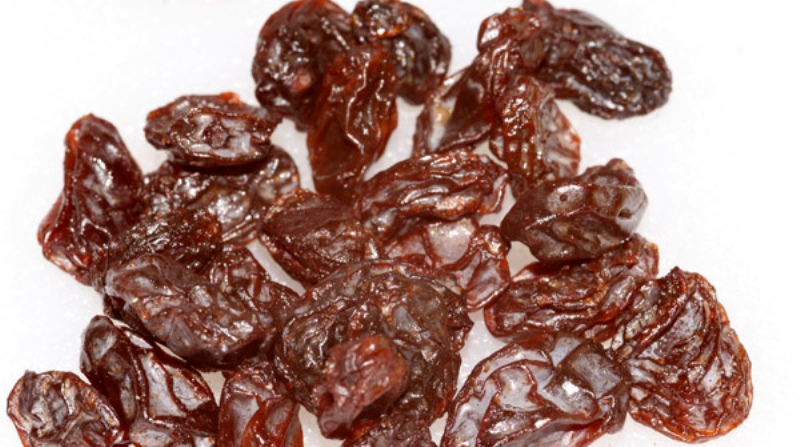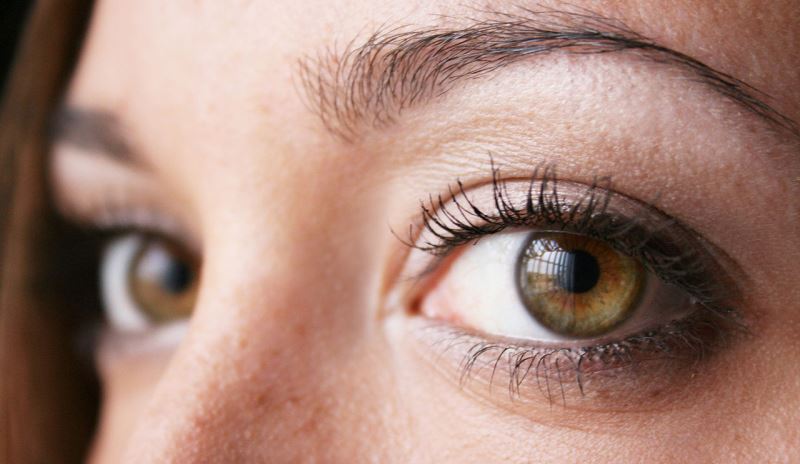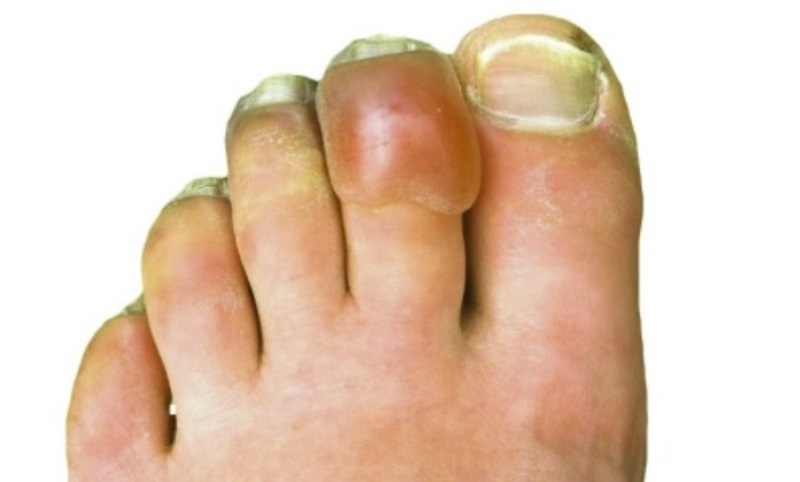Raisins are nothing but dried grapes, which are used extensively in almost all parts of the world. They may be eaten raw, or used in cooking, baking, and brewing, depending on your preference. Raisins are called sultanas and currants, depending on the color of the dried grape, and where you are in terms of geographically.
Traditionally, raisins are sun-dried, but they are also known to be water-dipped and dehydrated artificially. The natural sun-drying process is what turns grapes into raisins. The natural sugars present in the grapes are oxidized and caramelized, giving the raisins their dark brown to black exterior.
Suggested read: All you need to know about the numerous health benefits of dates
Types of raisins

Image source: Google, copyright-free image under Creative Commons License
Raisins, which are dried grapes, are fruits of the Vitis vinifera plant. There are mainly three types of raisins that are available on the market:
- Natural – sun-dried
- Water-dipped – artificially dried
- Sulfur dioxide-treated raisins
The type of grape used determines the raisin varieties, and can be found in different sizes and colors, including black, brown, yellow, green, purple, and blue. Seedless raisin varieties include the sultana, the Greek currants, and Flame grapes. Golden raisins are obtained by exposing grapes to sulfur dioxide gas, which prevents the sugars from oxidizing and caramelizing, letting the raisins to dry, which are left with a golden hue.
History of raisins
Raisins have been around since forever! They were first grown in Persia and Egypt, as early as 2000 BC, and they have been mentioned numerous times in the Bible too. Romans and Greeks were believed to decorate their areas of worship with raisins, while they were also awarded as prizes at sporting events.
Until the 20th century, Greece, Turkey, and Iran were the primary raisin producers in the world. However, by mid-20th century, the USA had surpassed all others to take lead in the raisin production, with Land Down Under, Australia, taking the second position.
Why consume raisins
Raisins are rich sources of phenolic compounds, which are known to play a major role in preventing and treating cancer. When compared to grapes and sun-dried raisins, golden raisins have shown the highest antioxidant capacity and phenolic content. Raisins contain the perfect amount of natural sweetness, making them one of the best natural sweeteners around.
Raisins nutritional facts
Raisins provide lots of energy upon consumption, besides providing dietary fiber, minerals like iron and potassium, and other essential nutrients. But, raisins are free of cholesterol and saturated fats, making it one of the healthier options to snack on. Plus, they are gluten-free, which is again a good thing for those are on a glute-free diet.
100g of raisins provides 300kcal of energy, along with:
- 79g of carbohydrates
- 7g of dietary fiber
- 60g of natural sugars
- 3g of proteins
- Vitamin B6 – 13% of daily value
- Vitamin B2 – 10% of daily value
- Vitamin B1 – 9% of daily value
- Vitamin B3 – 5% of daily value
- Vitamin C – 3% of daily value
- Vitamin K – 3% of daily value
- Vitamin E – 1% of daily value
- Vitamin B9 – 1% of daily value
- Potassium – 16% of daily value
- Phosphorus – 14% of daily value
- Iron – 14% of daily value
- Manganese – 14% of daily value
- Magnesium – 9% of daily value
- Calcium – 5% of daily value
- Zinc – 2% of daily value
- Sodium – 1% of daily value
Health benefits of raisins
Raisins are one of the most popular choice of healthy snack options, based on taste alone. Also, they contain antioxidants, flavonoids, polyphenols, and other nutrients that are hugely beneficial for your overall health. Let’s take a look at some of the main health benefits of raisins:
1. Raisins improves oral health.

Image source: Google, copyright-free image under Creative Commons License
Raisins are one of the best foods for promoting oral health by decreasing the likelihood of cavities and gum disease, and also naturally reverse cavities and heal tooth decay. Raisins contain oleanolic acid, which is a phytochemical, that inhibits the growth of oral bacteria, which cause cavities and gum disease. Even though raisins are rich in natural sugars, they help keep your mouth and teeth free from cavities.
2. Raisins aid in digestion.
Raisins are a high-fiber food that aid in digestion. They contain both soluble and insoluble fiber, which help keep the intestinal tract healthy, by reducing constipation, but at the same time, discouraging loose stools as well. Therefore, raisins not only aid in digestion, they also prevent constipation. Also, raisins are high in calories and natural sugars, but they are high in fiber as well, which somewhat balances out. So, if you add raisins to your meals and snacks and cereals, you are, in essence, increasing your fiber intake.
Suggested read: All the numerous kickass health benefits of almonds
3. Raisins lower blood pressure.
They also help reduce risk of stroke, because raisins are rich in heart-healthy electrolyte potassium. Potassium is key for the proper functioning of all cells, tissues, and organs in the human body.
4. Raisins help manage diabetes.
Eating raisins helps control the glucose levels in the blood, along with a significant lowering of systolic blood pressure. The fiber content in raisins helps your body to process the raisins’ natural sugars, which in turn helps prevent insulin spikes, thereby managing diabetes naturally.
5. Raisins help prevent cancer.

Image source: Google, copyright-free image under Creative Commons License
Raisins contain high levels of phenolic compounds, which have high antioxidant powers than what is found in fresh fruits. As you well know, antioxidants are extremely important for your overall health, since they prevent free radicals from causing cellular damage in your body. (Free radicals are highly reactive chemicals that are potent enough to harm cells.)
Free radicals are one of the main factors that lead to spontaneous growth as well as proliferation of cancer cells. Hence, foods that are rich in antioxidants like raisins, are great natural cancer treatments. Including raisins in your daily dietary intake, you’re increasing your antioxidant levels naturally, while also lowering the cellular damage caused by free radicals, and help keep cancer at bay.
6. Raisins help alleviate anemia.

Image source: Google, copyright-free image under Creative Commons License
Raisins are rich in iron, copper, and B complex vitamins, all of which are essential for the formation of red blood cells. Also, these vitamins and minerals help cure anemia caused by iron deficiency, while also help promoting blood clotting which is essential during healing of wounds.
7. Raisins help fight off infections.
As mentioned above, raisins are powerhouses of phenolic phytochemicals, which are germicidal, antibacterial, and antioxidant in nature, which help cure fever by fighting off bacterial and viral infections.
8. Raisins help alleviate acidity.
Raisins are rich in magnesium and potassium, both of which aid in lowering acidity. Acidity is caused by a condition called acidosis, which is often characterized by blood toxicity, giving rise to gases in the respiratory system. This is considered harmful, since it could possibly lead to other health problems like skin diseases, arthritis, gout, boils, hair loss, heart disease, and in some cases, cancer too. Since potassium and magnesium are important components of antacids, the help neutralize the acids, thereby preventing the acidosis process.
9. Raisins promote eye health.

Image source: Google, copyright-free image under Creative Commons License
As stated above, raisins contain high levels of polyphenolic phytonutrients, that are good for your eyesight. Since these phytonutrients are nothing but powerful antioxidants, they help protect your eyes from free radical damage, thus preventing macular degeneration, cataracts, and even other age-related vision weakness. Also, raisins contain significant amounts of vitamin A, beta carotene, and carotenoids, all of which are known to promote healthy eyesight.
10. Raisins are natural energy boosters.
Loaded with carbohydrates, particularly natural sugars like glucose and fructose, raisins are an amazing source of energy. They also help efficient absorption of vital nutrients like vitamins, proteins, and others.
11. Raisins help fight insomnia.
The high content of iron present in raisins is known to help in treating insomnia, since it helps improve the sleep quality in an individual.
12. Raisins promote bone health.

Image source: Google, copyright-free image under Creative Commons License
Calcium is essential to promote bone health, and raisins are excellent sources of this vital mineral. Raisins are known to not only promote bone growth, they also strengthen bones. Also, raisins contain boron, a micronutrient that the body requires in small amounts. This micronutrient is essential for calcium absorption and bone formation. Also, it helps prevent osteoporosis induced by menopause in women, as well as strengthen joints and bones.
13. Raisins promote kidney health.
Potassium contained in raisins are known to prevent the formation of kidney stones, thereby promoting kidney health.
Suggested read: All the numerous health benefits of acai berry you probably didn’t know
14. Raisins promote healthy, clear skin.
Since raisins are rich in antioxidants, they help maintain healthy, glowing, and clear skin, by fighting off the free radical damage to the skin. Also, they contain resveratrol, a powerful antioxidant, that is known to slow down aging of skin cells, thereby giving your skin a youthful glow. Also, raisins help purify your blood by destroying black and toxic cells, while also help improving the formation of red blood cells by supplying oxygen to your skin. These properties of raisins that help purify your bood are what make your skin look radiant, nourished, and beautiful.
These are all the numerous health benefits of raisins, and the reasons why you should include them in your daily dietary intake.
Featured image source: Pixabay, under Creative Commons License













